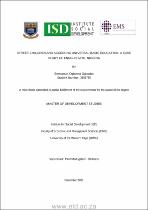| dc.description.abstract | The phenomenon of street children presents a global challenge as it continues to increase and affects almost every nation. Nigeria is no exception, with an ever-increasing population of street children, with many of them as a result of insurgence attacks in various states in Nigeria. The Nigerian government acknowledges that education is a key to development and a great tool in changing the dynamics of street children. It further recognises education as a right and not a privilege, especially with Nigeria’s adoption of the United Nations Convention on the Rights of the Child and the passage into law of the Child’s Right Act of 2003. The importance of basic education, which serves as the
foundation of the education system, cannot be over-emphasised, particularly since the government made free basic education one of the core mandates of the Universal Basic Education Board. However, the continuous loitering of children during school hours has led to questions being asked about the implementation of the free basic education programme. Using Enugu State as a case study, and applying the right-based approach, this study sought to find answers to why street children might not be accessing the free basic education. The phenomenon of street children not accessing this education, is contributing to their ever-growing numbers in the streets of Nigeria. This is a qualitative study that was conducted in Enugu, Nigeria. It used the purposive sampling technique, targeting children living on the streets, as well as policy makers, programme officers of the Universal Basic Education Board, administrative heads of basic education schools, nongovernmental organisations (NGOs), and community-based organisations (CBOs) working in areas relating to street children. The study used qualitative data collection methods comprising of focus group discussion and in-depth interviews. The data collected was analysed using NVIVO Qualitative Research Software. The study sought to identify the challenges and make recommendations to relevant
stakeholders, to improve policy implementation, and to present specific recommendations to ensure better access for street children and other vulnerable groups to benefit from policies such as the Universal Basic Education policy. It is discovered that many street children will love to go to school but other factors such as poverty, poor implementation of the free education policy among others have kept these children out of school. These children aspire to be teachers, doctors, accountants, lawyers and business administrators and wish they can be sponsored or given free education. | en_US |

